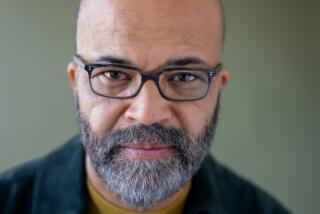Without Him, Sebastian Would Be Speechless : Movies: The actor who gives voice to Sebastian the crab in ‘The Little Mermaid’ goes largely unrecognized. But a videotape of his work was so exciting that Disney showed it to staffers for inspiration.
WALDEN, N.Y. — It is lunchtime at Soudani’s, the most fashionable eatery in this Upstate village, the home town of actor Samuel E. Wright. The actor delivered an indelible performance in one of the country’s hottest movies, and yet, not a head turns when Wright enters the restaurant.
The oversight is forgivable, given the lack of physical similarity between Wright and his on-screen role. Wright is a tall, spindly black man. His character is 4 inches high and lobster red. Wright is also stabbing at a plate of sole, a sight that would give his squeamish on-screen character an underwater fit.
Wright is the voice behind Sebastian, the tiny crab courtier to the sea king Triton in Disney’s “The Little Mermaid.” In a movie literally swimming with memorable characters, Sebastian steals the show.
Over that sole-ful lunch, Wright slips easily into character, his voice softening into a familiar Caribbean lilt, and he becomes Sebastian, down to the tiniest degree. And close inspection reveals that, yes, there may even be a faint physical resemblance there, after all. He has Sebastian’s eyes.
“You see these bags?” the actor asks, leaning and running a finger beneath each of huge, slightly bug eyes. “They’re on Sebastian, too.”
The lack of broad public recognition is, at best, a mixed blessing for any actor. But for Wright, it is a circumstance he has learned to live with. Before playing Sebastian, the actor’s broadest exposure in a 20-year career came as the bunch of grapes in the Fruit of the Loom underwear commercials.
Along the way, Wright has had serious roles as well, occasionally even playing humans. Before “The Little Mermaid,” his most recent film work was as jazz great Dizzy Gillespie in Clint Eastwood’s little-seen “Bird.” He earned a Tony nomination for his performance as the stern father in “The Tap Dance Kid.”
Recognizing that his was a serendipitous career, Wright couldn’t guess what might result when he was asked three years ago to prepare a clever little calypso number called “Under the Sea” for an audition. A cruise ship cabaret, perhaps? The songwriting team of Howard Ashman and Alan Menken, the creators of the stage version of “The Little Shop of Horrors,” were in New York after vainly scouring Hollywood for actors to voice the roles of Sebastian, a crab with no appetite for seafood-loving humans, and the mermaid heroine Ariel.
They set up shop at 42nd Street and 8th Avenue, in the seedy neighborhood around the Port Authority bus terminal. Wright thought it an unlikely address for any project of real promise, but he was in a gambling mood. Instead of giving them just his voice, he auditioned as if trying for the lead in a Broadway musical, bouncing across the room, fingers snapping, arms waving.
“Howard’s eyes are like saucers,” Wright says. “But I wondered, ‘What happened, did I do the wrong thing?’ ”
Ashman and Menken didn’t think so. They sent Wright’s audio tapes to director Ron Clements back at the Disney studios, and they had their crab.
“Sam was good on the dialogue, but he was great on the song,” Clements said. “Some voices are an inspiration. You can close your eyes and see the performance.”
But even Clements was delighted beyond all expectation when he actually saw Wright perform “Under the Sea” in the Disney studio. “We videotaped that whole session,” Clements says. “We showed it to the entire staff for inspiration because it was so much fun to look at.”
The song, a steel-band paean to the virtues of life in the deep, gets airplay on at least one FM rock station in New York. In it, Sebastian reminds Ariel, who longs to be human, what she would leave behind:
We got a hot crustacean band . . .
each little clam here know how to jam here . . .
each little snail here know how to wail here . . .
under the sea.
That song and Sebastian’s other number, “Kiss the Girl,” a serenade sung to Ariel and her handsome prince, were recorded first. Sebastian’s dialogue proved more problematic for Wright, who was unaccustomed to acting alone in an empty studio.
“It didn’t feel right somehow. I’m 6-foot-3 and Sebastian is all of 4 inches, and it just wasn’t coming across,” says Wright. “I couldn’t act the role. I was talking into a microphone like I was doing a commercial.”
So Wright improvised, asking that the mike be moved up and away from him, forcing him to talk up, to strain a bit to be heard. “So everything I say is like Sebastian would be saying it--just out of earshot, trying to get attention.” Call it Underwater Method acting.
Voice acting, Wright found, is in some regard even tougher than other acting because a player not only has to create his character, but his character’s environment, as well.
“When I looked at the little mermaid, I just didn’t see a shadowy face floating in front of mine,” Wright says. “There was an actual three-dimensional thing that moved in space. I could see her fins, I knew exactly what relation they were to her body.”
On dry land, Wright leads a standard sort of life in this village, 75 miles into the cold of the Hudson River Valley. He lives with his wife and three children in a Victorian home done up for Christmas in evergreen garlands and big red bows. It is testament to his skills, and those of Disney’s animators, that Sebastian’s alter-ego seems almost out of place in so conventional a setting.
Almost like a crab out of water.
More to Read
Only good movies
Get the Indie Focus newsletter, Mark Olsen's weekly guide to the world of cinema.
You may occasionally receive promotional content from the Los Angeles Times.










